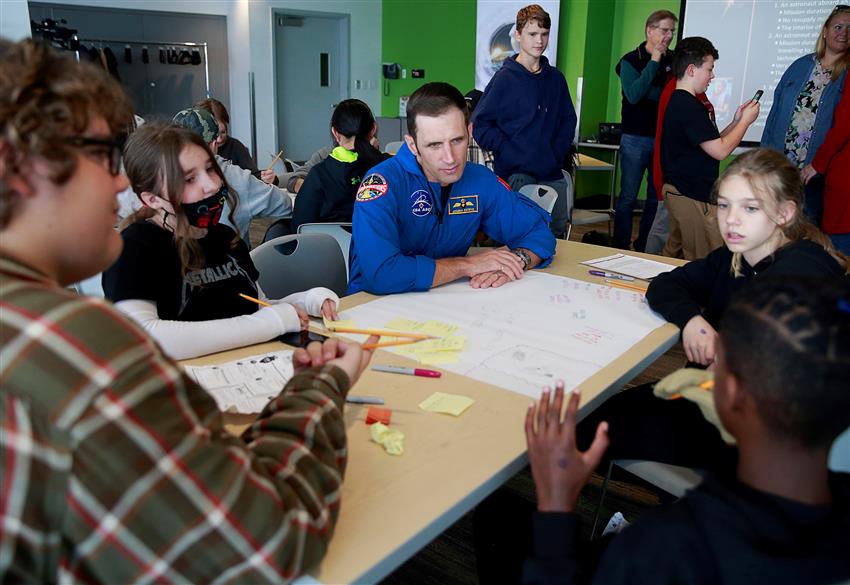The CSA invests in the next generation
"After this, I want to go to the Moon, but I don't know if it's going to happen,
" said Grade 6 student Mia Marquez. "It was a great experience … to move a rover. It was pretty cool.
"
Inspiring young Canadians like Mia to reach for the stars and to study science, technology, engineering and mathematics (STEM) is a priority of Canada's Space Strategy. In , the Canadian Space Agency (CSA) ramped up its STEM outreach efforts in a big way.
To connect youth to real space challenges, we launched the Space Brain Hack, an annual initiative running from October to February to get youth in grades 6 to 12 thinking about solutions to open-ended problems and questions related to the Lunar Gateway and other space missions. The theme this year: mental health and isolation.
We also committed over $3.5 million through grants, contributions and contracts for the development and delivery of multi-year space STEM activities designed for K–12 youth and educators across the country. These hands-on projects relate to robotics and artificial intelligence, lunar science and rovers, health and nutrition, and Moon missions. Through these activities and a variety of events, we engaged over 25,000 educators and young Canadians across the country, especially kids underrepresented in STEM, and connected them to experts.
One of the funded projects is the Lunar Rover Research Challenge, in which Mia participated. It is a national space competition for youth in grades 6 to 9 offered by Let's Talk Science, Canadensys Aerospace Corporation and Avalon Space. It allows students to collaborate and develop a mission for lunar exploration.
Over 3,500 young people from across Canada participated in the first edition of the challenge in fall . Students from London, Penetanguishene, Lacombe, and Niagara Falls won the opportunity this past to virtually control a Canadensys lunar rover in a Moon-like environment, allowing them to interact with technology that will be part of Canada's upcoming rover mission. They completed a mission simulation by taking different roles and working as a team to drive the rover and seek out ice deposits in a mock lunar landscape.

"The Earthlings
" (foreground) is one of four winning groups of the first edition of the Lunar Rover Research Challenge. Their whole class at Burkevale Protestant School in Penetanguishene, Ontario, got to do a mission simulation and drive a rover in . (Credit: Austin Vavrovics, Grade 6 teacher at Burkevale Protestant School)
Emma Christie, Grade 6 educator in Niagara Falls, Ontario, said this about the challenge: "My students were actively engaged in the project from start to finish. I overheard many great conversations between students that involved critical thinking, problem solving and reflection.
" Activities like this one also encourage youth to consider all the opportunities available in space exploration and STEM careers. We want them to see how they could play a role in Canada's missions to the Moon, and beyond.
Registration for the spring session of the Lunar Rover Research Challenge opened in January, and a third edition will run in the fall. The CSA is also working on other exciting learning opportunities with partners for and beyond. Stay tuned!
What educators had to say about the Lunar Rover Research Challenge
"It is always nice to find something to get passionate about, and this had me really excited (and still does)."
"Students were really interested to understand the Canadian role in Artemis. I think it was inspiring to read about Canadian scientists and companies who have a big role in space exploration and study. This project opened their minds to understanding how space exploration relates to problems here on Earth. We had lots of good discussions about science and ethics."
"This project highlighted the contributions of Canada to space exploration, which is closely linked with our curriculum. […] It also showed students the future of space exploration, and how we are working together to explore the Moon and beyond. It helped them see the value of space exploration by looking at the technologies that they use daily that are direct developments of the space programs of the past."
